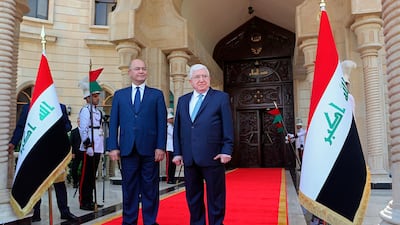But for a phone call, Iraq’s new president would not have lived to see the ouster of Saddam Hussein he had sought his whole life.
In 2002, while prime minister of the eastern half of what is now the Kurdistan Region of Iraq, Barham Salih survived an assassination attempt by a Kurdish member of Ansar al Islam, a Kurdish extremist group. The militant shot dead three of Mr Salih's bodyguards. After the terrorist's arrest, bucking expectations of revenge, he refused to sign the death warrant.
It’s an episode that demonstrates Mr Salih’s appeal at a time when Iraqi politics is fracturing and the promise of a better future after a bruising war against ISIS is slipping away. Mr Salih has been a strident critic of Iraq’s failures, calling it “a tragic failure sustained only by high oil prices” before ISIS reached their zenith, and “a near-kleptocracy, riven by partisan and ethno-sectarian division” after. But he’s still an avowed believer in Iraq’s potential.
A generation younger than the totemic leaders of Kurdish politics, Mr Salih joined Jalal Talabani’s PUK as it split from the Kurdistan Democratic Party in 1976, at a low ebb for Kurdish resistance to Saddam Hussein. After arrests, he fled Iraq for the UK, obtaining engineering degrees.
Mr Talabani dispatched Mr Salih to the US in 1992. Genial, charismatic and eloquent, with a dry sense of humour and a nose for intrigue, his popularity with Western diplomats and journalists developed over a decade in Washington.
He returned to Iraq in 2002 to be prime minister of the eastern part of the Kurdistan region, and later served as deputy prime minister of Iraq and prime minister of the autonomous Kurdish Regional Government.
______________
Read more:
Iraq PM designate Adel Abdul Mahdi met with cautious optimism
A vision for ending Iraq’s crises by Barham Salih for The National
Editorial: Hope may finally be on the horizon for Iraq
______________
In his two years as KRG Prime Minister from 2009 to 2011, the government enacted several reforms but was both frustrated by rivals in government and threatened by the rise of a new opposition party that threatened the PUK’s grip on Sulaymaniyah.
Mr Salih idolized Mr Talabani, known widely as “Mam” - or uncle - Jalal, and in return was cultivated as his successor. Instead, he was increasingly marginalized after Talabani debilitating illness in 2012, and the Talabani family consolidated power.
Mr Salih founded American University in Sulaimaniyah, an English-language, liberal arts college, in 2007. It’s a rare example of an Iraqi institution that has flourished, not faltered there over the last decade.
Though Mr Salih no longer runs the university, he’s often padding around in a pair of Salvatore Ferragamo moccasins, and is a kind of father figure about campus: many of the 1,400 students - who come from all over to study there - have selfies with a smiling ‘Doctor Barham’ on their phones. It is a microcosm of the kind of country Mr Salih wants to see, and is one of the most optimistic and dynamic places to spend time in Iraq.
After the 2003 invasion, Mr Salih brought some of the optics of Western politicking back to Kurdistan. On election days, as other Kurdish politicians zoomed in vast cavalcades of SUVs to cast their special ballots at gilded hotels. Mr Salih would typically be driven by his wife Sarbagh, a botanist and activist, to a local primary school to cast his vote.
While he has deep ties to the US, Salih isn’t beholden to them and has his own large network of contacts and relationships with much of Iraq’s political class and in the region. He maintains his own relations with a range of Iranian officials and has frequently travelled there on state, regional and party business. He views the US more instrumentally than some may think.
He also straddles lines in Kurdish politics. An advocate for the Kurdistan’s constitutional rights to develop and export oil and gas, Mr Salih signed the Kurdistan region’s first independent oil deal in 2002, on a kitchen table, in green ink. As KRG PM, he signed up ExxonMobil in 2011, a landmark moment for the region. But he’s never endorsed the KRG’s unilateral oil exports and has been a strong critic of how oil revenues have been managed.
He was also leery of the independence referendum held by the KRG last year, a stance that motivated many Iraqi MPs to buck their party bosses on Tuesday and vote him in. His election has stung the KDP, which nurtures grudges.
After several years on the sidelines, Mr Salih can now try to take up Mam Jalal’s mantle. Yet neither Iraq nor its presidency are what they were. The presidency lost veto power over parliament in 2010. His appointment is likely to revivify the office, which fell into a slumber after Talabani left. But unlike Mam Jalal, he does not command a large constituency or military force, and his ability to corral a fracturing body politik may be limited.

